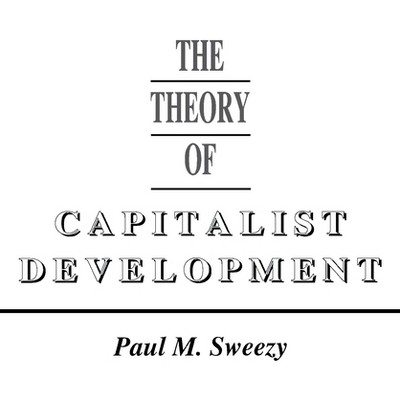Sponsored

Soviet Non-Capitalist Development - by Esmail Hosseinzadeh & Ismael Hossein-Zadeh & Esmael Hosseinzadeh (Hardcover)
In Stock
Sponsored
About this item
Highlights
- The sense one gets from this most interesting book is that the change Nasser wrought in the Egyptian economy was more out of expediency than out of ideological commitment.
- About the Author: ESMAIL HOSSEINZADEH is Assistant Professor, Department of Economics at Drake University.
- 222 Pages
- Political Science, Political Ideologies
Description
About the Book
The sense one gets from this most interesting book is that the change Nasser wrought in the Egyptian economy was more out of expediency than out of ideological commitment. According to Hosseinzadeh, those who argue that Nasser's development path was noncapitalist or socialist are wrong; he presents their arguments and refutes them. Indeed Egypt's path, he argues, was closer to state capitalism than to any other path. . . . Highly recommended for faculty, advanced undergraduates, and graduate students. Choice
This clear, comprehensive book examines the theoretical, ideological, and political aspects of the official Soviet approach to Third World economic development. Of particular interest is the analysis of the so-called theory of non-capitalist (NCD) path to socialism, which is studied both theoretically and empirically. The author traces the history of thought leading to successive versions of this theory and provides a persuasive critique of it. This history begins with Marx and Lenin, continues with Trotsky and the resolutions of the Comintern Congresses of the 1920s, and leads through the Stalin era to the influence of Soviet experiences with national and social movements in the Third World. The book ends with recent reassessments of the Soviet approach to Third World developments under Gorbachev and his co-thinkers. This definitive work is of value to all those interested in Soviet studies, Third World--especially Middle East--studies, and the study of Soviet-Third World relations in general.
The author challenges Soviet Third World experts by examining the substance of their theories and the relevance of their policies from a Marxist point of view. The claims of these experts are tested against the actual developments of Nasser's Egypt, the most frequently cited case of non-capitalist development. The study of the case of Egypt focuses on the extensive nationalizations that were implemented under the Free Officers' rule, the philosophy of those nationalizations, the character of state capitalist regimes and their tendency toward expanding the public sector, the differences between socialism and state capitalism, and the like.
Book Synopsis
The sense one gets from this most interesting book is that the change Nasser wrought in the Egyptian economy was more out of expediency than out of ideological commitment. According to Hosseinzadeh, those who argue that Nasser's development path was noncapitalist or socialist are wrong; he presents their arguments and refutes them. Indeed Egypt's path, he argues, was closer to state capitalism than to any other path. . . . Highly recommended for faculty, advanced undergraduates, and graduate students. Choice
This clear, comprehensive book examines the theoretical, ideological, and political aspects of the official Soviet approach to Third World economic development. Of particular interest is the analysis of the so-called theory of non-capitalist (NCD) path to socialism, which is studied both theoretically and empirically. The author traces the history of thought leading to successive versions of this theory and provides a persuasive critique of it. This history begins with Marx and Lenin, continues with Trotsky and the resolutions of the Comintern Congresses of the 1920s, and leads through the Stalin era to the influence of Soviet experiences with national and social movements in the Third World. The book ends with recent reassessments of the Soviet approach to Third World developments under Gorbachev and his co-thinkers. This definitive work is of value to all those interested in Soviet studies, Third World--especially Middle East--studies, and the study of Soviet-Third World relations in general. The author challenges Soviet Third World experts by examining the substance of their theories and the relevance of their policies from a Marxist point of view. The claims of these experts are tested against the actual developments of Nasser's Egypt, the most frequently cited case of non-capitalist development. The study of the case of Egypt focuses on the extensive nationalizations that were implemented under the Free Officers' rule, the philosophy of those nationalizations, the character of state capitalist regimes and their tendency toward expanding the public sector, the differences between socialism and state capitalism, and the like.Review Quotes
." . . . the study is concise, logical, beautifully documented and makes a fundamental contribution to the understanding and evaluation of an important line of thinking in regard to Third World development."-Thomas Vietorisz Professor of Economics The Graduate Faculty of the New School for Social Research
." . . a very important contribution to the political economy of the Middle East"-Nancy Folbre Associate Professor of Economics University of Massachusetts at Amherst
"A thoughtful, readable, innovative and carefully documented piece of economic history. There is no doubt that it is a contribution to our understanding not only of the Soviet theory of Third World development but also of Third World nationalist leaders' policies of economic development and political independence."-Robert L. Heilbroner, Norman Thomas Professor of Economics
?. . . Hsseinzadeh's book makes a valuable contribution in that it departs from those Sovietologists who failed to assess critically the NCD thesis. Its strength is that the criticism is made from within the Marxist perspective from which the proponents of NCD claim to draw their analysis. The study provides a refreshing approach for analyzing those Third World countries that followed the NCD path. . . . extremely helpful to scholars interested in the study of the failure of state capitalism and state socialism in the Arab world.?-Middle East Journal
?The sense one gets from this most interesting book is that the change Nasser wrought in the Egyptian economy was more out of expediency than out of ideological commitment. According to Hosseinzadeh, those who argue that Nasser's development path was noncapitalist or socialist are wrong; he presents their arguments and refutes them. Indeed Egypt's path, he argues, was closer to state capitalism than to any other path. This was partly because Nasser highly regarded private property and disliked Soviet atheism. He resorted to economic regulation, then Egyptianization of foreign assets, and finally nationalization of domestic industries only as he met resistance or perceived threats from property owners. And, contrary to what the title might suggest, the Soviet Union had little influence in directing Nasser's economic decisions, but Egypt's association with the USSR may have made them easier. In the appendix, the author suggests that the Soviet Union is no longer a model for Third World development, but has itself become an example and advocate for more capitalistic reforms. . . . Useful bibliography and index. Highly recommended for faculty, upper-division undergraduates, and graduate students.?-Choice
." . . Hsseinzadeh's book makes a valuable contribution in that it departs from those Sovietologists who failed to assess critically the NCD thesis. Its strength is that the criticism is made from within the Marxist perspective from which the proponents of NCD claim to draw their analysis. The study provides a refreshing approach for analyzing those Third World countries that followed the NCD path. . . . extremely helpful to scholars interested in the study of the failure of state capitalism and state socialism in the Arab world."-Middle East Journal
"The sense one gets from this most interesting book is that the change Nasser wrought in the Egyptian economy was more out of expediency than out of ideological commitment. According to Hosseinzadeh, those who argue that Nasser's development path was noncapitalist or socialist are wrong; he presents their arguments and refutes them. Indeed Egypt's path, he argues, was closer to state capitalism than to any other path. This was partly because Nasser highly regarded private property and disliked Soviet atheism. He resorted to economic regulation, then Egyptianization of foreign assets, and finally nationalization of domestic industries only as he met resistance or perceived threats from property owners. And, contrary to what the title might suggest, the Soviet Union had little influence in directing Nasser's economic decisions, but Egypt's association with the USSR may have made them easier. In the appendix, the author suggests that the Soviet Union is no longer a model for Third World development, but has itself become an example and advocate for more capitalistic reforms. . . . Useful bibliography and index. Highly recommended for faculty, upper-division undergraduates, and graduate students."-Choice
About the Author
ESMAIL HOSSEINZADEH is Assistant Professor, Department of Economics at Drake University.Shipping details
Return details
Trending Non-Fiction











